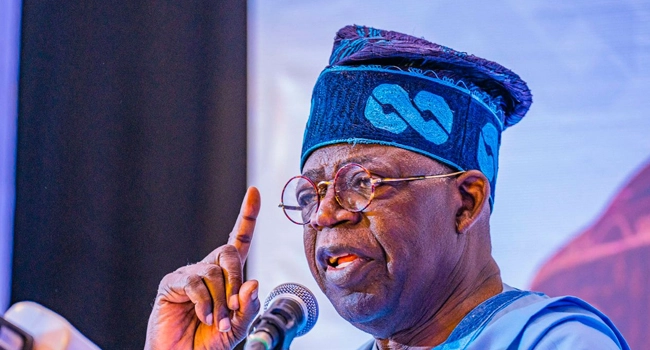Tinubu: Why I can’t implement the national reform strategy for Lagos

Bola Tinubu, the All Progressives Congress’s presidential candidate, has claimed that Nigeria’s complexity makes it difficult to replicate his transformative vision outside of Lagos.
In order to ensure that the administration runs smoothly, the former governor of Lagos State also declared that he would permit power devolution.
In an opinion piece that he published in The Economist on Wednesday, Tinubu made this point clear.
“We can’t just copy Lagos’ turnaround everywhere. Nigeria is diverse and multifaceted. The key to economic progress is recognizing each region’s assets and laying the groundwork for their mutual prosperity. I want to give the states more authority because I know what can be accomplished when the federal government gives appropriate room for regional variances. As Tinubu recalled his accomplishments as the two-term governor of Lagos, “They should have greater ability to provide services and infrastructure projects, as well as more control over law enforcement.”
Further, Tinubu claimed that the nation’s excessive reliance on oil has hampered its progress.
Nigeria’s development has been hampered by an overreliance on oil. A nation with a population of more than 200 million cannot base its development on a single good. Given that Nigeria is already the most popular African country in which to invest in startups, we must concentrate on industrialization and technical innovation, he said.
The APC candidate also reaffirmed his support for eliminating gasoline subsidies, which he believes to be “destructive.”
The detrimental gasoline subsidy, which is anticipated to have cost $7.5 billion in the first half of 2023, would be eliminated, he continued. The money will be put to better use by being invested in together with the private sector to build infrastructure, improve healthcare, improve education, and expand agriculture.
Nigeria has one of the lowest tax to GDP ratios in the world. Instead of raising rates, we should restructure the system and use information technology to increase compliance. A positive feedback loop of support from businesses and citizens would reinforce the social contract and put federal revenues on a more sustainable foundation when coupled with efficient public service delivery and infrastructure development.







